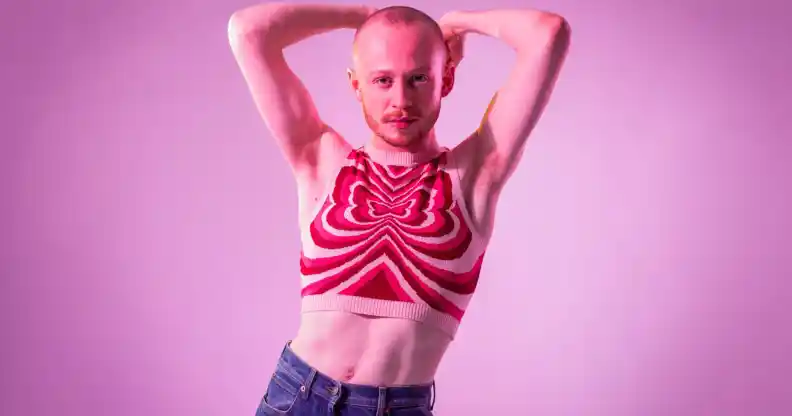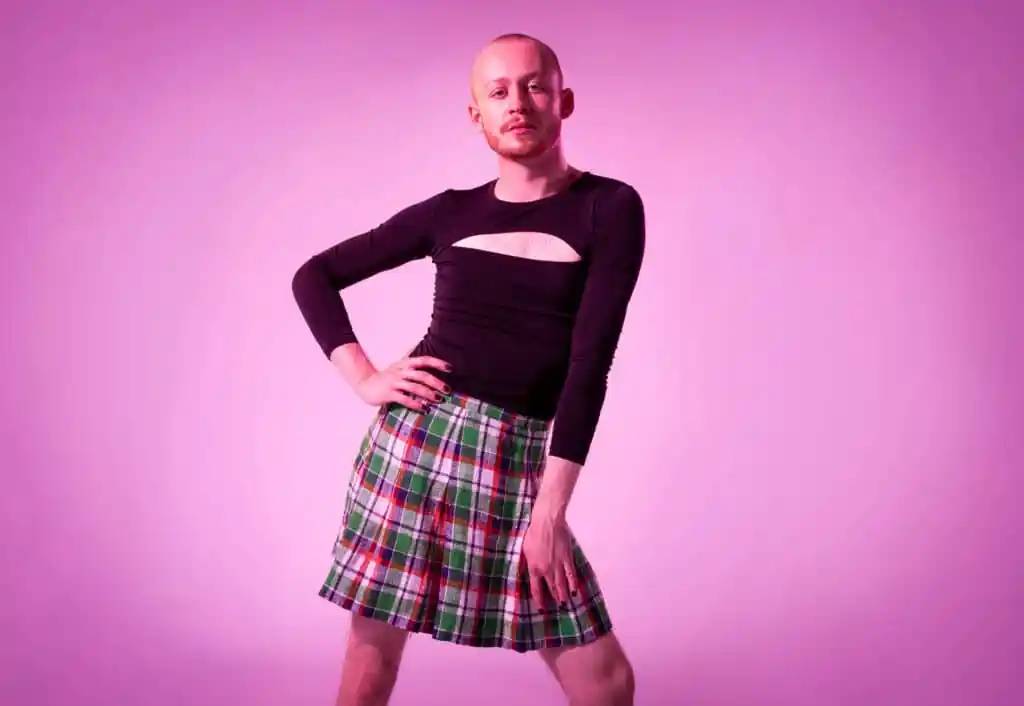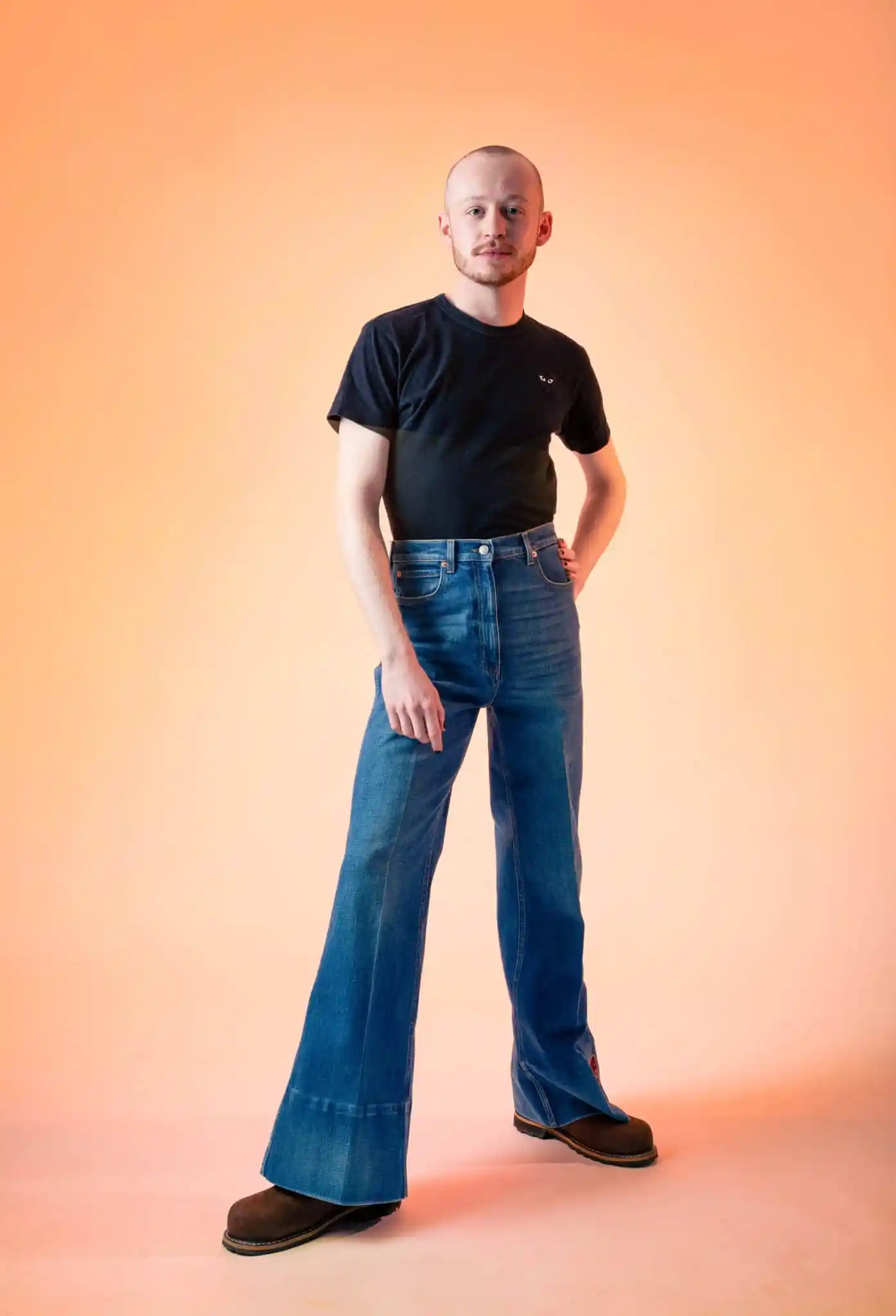Outlander’s John Bell on growing up queer in film: ‘I had moments of wanting to pray the gay away’

John Bell. (Mark Senior)
John Bell. (Mark Senior)
Outlander star John Bell is about to play a gay character for the first time – and he can’t wait.
It’s safe to say that John Bell has never exactly been starved of opportunities. The Scottish actor started his career as a child star, making a name for himself in The Hobbit. Since 2017, he’s been making waves on Outlander, the historical series that just keeps getting more and more popular.
He is just 24 years old and he already has a legion of fans across the world – but somehow, he’s never had the chance to play a gay character.
That’s why he jumped at the opportunity to take on The Night Larry Kramer Kissed Me, the acclaimed one-man show that’s been taking audiences on a whirlwind tour of LGBT+ rights and history since it debuted in 1992.
“It was an opportunity to play somebody gay, and I’d never done that before in my career, even though I am gay. On Outlander, I’m playing a straight character, a guy who’s very different to me, so it was nice to go back and play something a bit more true to me.”

When John spoke to PinkNews, he was still in rehearsals for The Night Larry Kramer Kissed Me – but he was already starting to notice how different it felt to play a gay character compared to a straight character.
“It’s funny, I think it’s actually more exposing playing gay characters,” John says. “Every character you play is different. In Outlander, my character has this bravado, he has a sort of warrior stance, and he’s got a comedic outlook. I love my character in Outlander, don’t get me wrong, but doing this play, this is a young gay man in a very scary time in history on his journey of self-discovery going through experiences both highly positive and incredibly negative.”
There isn’t “as much to hide behind” when you’re a gay man playing a gay character, John says – and he’s found that experience exhilarating. But taking on a one-man show like this one doesn’t come without its challenges. He’s also keenly aware of the responsibility he has to both the material and to the audience.
“There’s a new generation of gay people that are adults now, and they’ve never experienced the AIDS crisis and HIV in the way it was back then. So I was excited to bring that story to a new generation of theatre-goers that maybe didn’t quite understand the seriousness of it. It’s been a point of learning for me too.”
It wasn’t quite AIDS that killed people, it was homophobia.
John is 24 years old – he was born in 1997, and he grew up in an era where HIV was a manageable condition (so long as you were able to access effective treatment). That meant he had to find his way into the story by educating himself on what it was like to live through that time.
“It’s still so recent. Yes, we might have grown up in a time that this was less serious, but our parents didn’t. I was able to sit down and talk to my mum about it and be like, ‘What was the feeling back then?’ My mum isn’t gay, she wouldn’t have been in the community as such, but what I took from what she was saying is that it wasn’t quite AIDS that killed people, it was homophobia. That was the true killer because nobody was doing anything about it. That was an interesting thing to learn about.”

John hopes the play will be empowering for young LGBT+ people, but he also wants it to be educational. So many queer people grow up knowing nothing about their history thanks to a regressive education system that positions queerness as the “other”. In that context, the arts can provide a vital opportunity for LGBT+ people to learn about the past.
“Do your research, appreciate that where we are now is only possible because of the activism of 30, 40 years ago. Pay homage, pay tribute to that. We learn from history.”
John Bell thinks it ‘makes sense’ to cast gay actors as gay characters
John is a gay man who’s about to take on one of the most coveted one-man queer plays of the last 30 years – so it seems fitting to ask what his thoughts are on straight actors playing gay characters.
John is of the same opinion as Russell T Davies, who made headlines last year when he said he wouldn’t cast straight actors in gay roles because he wanted “authenticity” in his shows.
“I think gay people should be playing LGBT+ characters,” John says. “But remember as well that we also pretended for years to be straight so we can play straight characters too,” he laughs.
Does he find the conversation frustrating? It’s a debate that just won’t go away, at least partly due to the fact that straight actors just keep on weighing in, with many jumping in to defend themselves. The media also plays a role – would he rather the conversation just stopped altogether?
“It’s an interesting conversation to have I think,” he says. “I don’t find it frustrating – as you say, there are so many viewpoints, and really at the core of it, I think it makes more sense to cast gay people as gay characters. But at the same time, if you’re an actor and you get a job and you’re straight, I’m not going to be hateful towards you for taking it. We’re actors trying to make a living, you should always say yes to the bloody job. So that part of it I understand.

“It would be nice to reach a point one day when it really doesn’t matter. I think of Drag Race having this heterosexual cisgender queen coming on, and that’s amazing. Drag should be done by anyone, and so should acting. But things have leant too far in one direction with a lot of very iconic roles being played by straight actors. Maybe we need to balance the books.”
Part of the reason that conversation just keeps coming up is because so many queer actors have been vocal about the homophobia they’ve experienced in the industry. Luckily, John hasn’t experienced anything like that – in fact, his experiences have been overwhelmingly positive.
I still had moments of ‘pray the gay away’ and not wanting to be gay.
“I grew up in this industry as a kid surrounded by successful, talented gay men. It’s full of people that inspired me. I think of The Hobbit and my time filming that, and I think of the incredible Ian McKellen who was around and the wonderful Adam Brown and Luke Evans and all of these people I could look up to as a kid and see them having successful careers. So I never really dealt with anything negative when it came to that.
“I was only surrounded by people that were celebrated. For me, that was inspiring. That kept me going. I’ve never really come across any homophobia in the industry which is great.”
Growing up surrounded by those role models was an incredible experience for John at a formative time in his life – but that doesn’t mean he was always comfortable with his sexuality. He felt an overwhelming pressure to fit in as a teenager.
“I still had moments of ‘pray the gay away’ and not wanting to be gay,” he says. “Those thoughts sort of seep into your head at bedtime when you’re on your own. Obviously there’s still something there that was telling me this isn’t normal and this is wrong, but that very quickly was squashed by the experiences in the film industry as I continued working. I kind of went, ‘Oh, I’m just like him and that’s amazing. He’s really cool. He’s really happy. It isn’t wrong. It isn’t bad. I think my parents will be cool with it.’ But there was still a journey.”
All these years later, John has fully embraced his identity as a gay man – but he still wonders where that internalised homophobia came from.
“My parents never said anything that was negative. As young gay kids, we must just be so in tune to [homophobia], to being different, and something must tell us that it’s bad. But I was luckily in a situation where those feelings didn’t last too long.”
John’s experience has shown him just how important meaningful LGBT+ representation is – he hopes queer kids growing up today will see themselves reflected back in popular media.
“People have to see themselves in the media and in stories that are being told,” he says. “It’s like the videos of the little girl that looks like the character from Encanto, and she’s jumping up and down and laughing, and that’s because she sees herself in it and it’s going to be her favourite film. If you have more representation, you’re not going to have as many people with those inner demons. It’s lovely to be a part of that.”
The Night Larry Kramer Kissed Me will run at the New Wimbledon Theatre from 3 February to 26 February. Tickers are available here.

